Economic
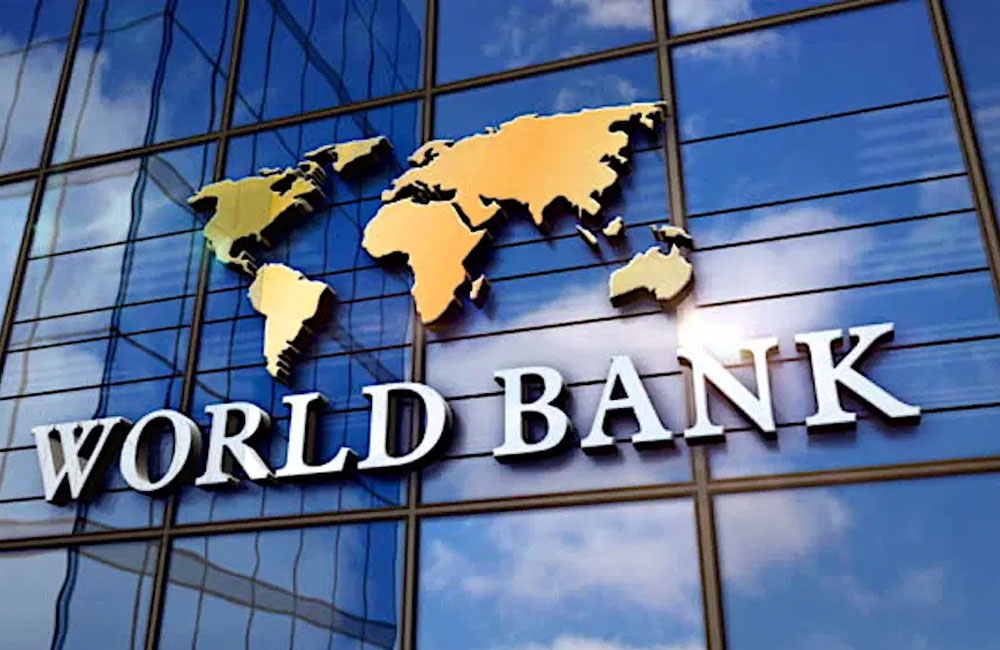
World Bank Warns: Recovery Holds, Structural Challenges Persist
The World Bank’s Global Economic Outlook 2026 notes Sri Lanka’s improving macroeconomic indicators but warns that recovery is driven more by fiscal tightening and favourable external conditions than by deep structural reform. While the country is expected to maintain fiscal and current account surpluses, growth is projected to slow to just above 3% by 2027, constrained by long-standing inefficiencies in labour and product markets, crisis-related scarring, and fragile global demand.
Key concerns include high emigration of skilled workers, leaving long-term gaps in productivity and innovation, and vulnerability to global trade shocks due to reliance on limited export markets. Risk preparedness also remains weak, with potential losses from disasters like Ditwah not yet factored into projections.
The report emphasizes that fiscal discipline alone is insufficient; sustainable growth requires targeted reforms, strategic labour policies, and resilient export strategies. Sri Lanka has stabilised its economy, but turning stability into inclusive, long-term growth remains the critical challenge.
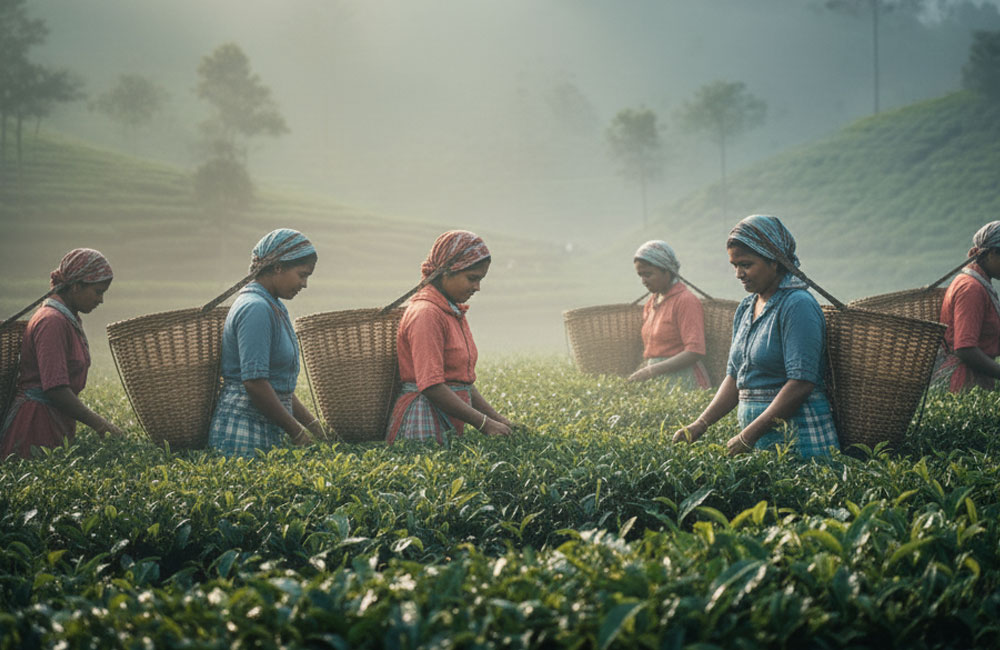
Treasury Funds to Private Estates Set Dangerous Precedent
A recent government proposal to allocate Rs 5,000 million from the unified Treasury fund to pay wages or allowances exclusively for workers in plantation companies — raised by MP Rohini Kaviratne and sent to the Auditor General’s Department and other oversight bodies — signals a significant shift in public‑finance policy with serious implications for the Sri Lankan economy.
At issue is the scheme’s focus: only plantation workers in certain companies would benefit from state funds. This raises both fiscal and equity concerns. Official labour‑force data show the “estate” residential sector accounts for roughly 316,658 employed persons (in the first quarter of 2024) out of about 7.9 million employed in total.
While historic data suggest the plantation workforce once numbered in the hundreds of thousands, some sources put active labour in plantations now at about 115,000 with wider dependent families.
The immediate economic burden: if Rs 5,000 million is to be spent, and assuming roughly 40,000 plantation workers (as cited by the MP) are covered, the average additional cost per worker would be Rs 125,000 or over Rs 10,000 per month, equivalent to far more than existing typical wage levels. Given the mean monthly wage for “estate” sector monthly‑earners is around Rs 42,000 (median) in 2023.
Extending this to a larger population (e.g., 100,000+ workers) would raise costs sharply, potentially placing unsustainable demands on public finances already under strain.
Beyond the numbers, the precedent is troubling: using public funds to subsidise what are essentially private‑sector plantation wages erodes the principle that the private sector should fund its labour costs.
It blurs lines between public and private responsibilities. The risk is further magnified by the fact that only some plantation companies (particularly large or state‑linked ones) would be eligible, creating a two‑tier system and possible inequity vis‑à‑vis smaller or medium‑sized private plantations and their workers. The MP herself voiced concern of “differential treatment” of workers in smaller estates.
Moreover, attributing the scheme to mistakes or mis‑management at the Treasury raises governance issues: if the budget procedure assigns such wage funding via the existing Public Finance Management Act to the Director‑General of Budget, misuse or unintended liabilities could become a recurring burden. The MP’s letter argues for intervention by oversight institutions to safeguard legal and administrative propriety.
For the economy, this proposal comes at a delicate time: the plantation sector remains a key source of export earnings (for example, tea exports alone constitute a significant foreign‑exchange inflow), yet cost pressures (wage increases, fertiliser, fuel) already threaten competitiveness.
By shifting wage‑funding onto the state, the policy may relieve plantation firms, but at the expense of the national budget and possibly at the cost of global competitiveness.
In conclusion, while the aim of improving wages for plantation workers is socially justifiable given long‑standing poverty in the sector, the mechanism proposed using public consolidation funds to pay private plantation wages risks placing large, open‑ended liabilities on the state, distorting public‑private boundaries, and setting a damaging precedent. A more sustainable option would involve establishing a wage‑support fund co‑financed by the state and the plantation industry, clearly time‑limited and targeted, with transparency on costing and coverage.

Manufacturing, Services Grow Steadily Despite Slower November Momentum
Sri Lanka’s manufacturing and services sectors continued to expand in November, although growth moderated from October’s stronger performance, reflecting seasonal adjustments and the impact of adverse weather, according to the latest Purchasing Managers’ Index (PMI) released by the Central Bank of Sri Lanka (CBSL).
The Manufacturing PMI recorded 55.5 in November, remaining firmly in expansionary territory but easing from 61 in October. CBSL noted that growth was broad-based, with all major sub-indices contributing positively, underscoring the sector’s continued role in supporting domestic production, employment, and supply chain activity during the final quarter of the year.
New Orders remained a key driver of manufacturing growth, led by increased activity in the food and beverages sector and the textiles and apparel industry. Manufacturers reported a surge in orders linked to seasonal and festive demand, reinforcing the sector’s importance in meeting domestic consumption needs and sustaining export-oriented industries such as apparel.
Production levels, however, remained broadly unchanged compared to October, suggesting that firms were consolidating output rather than aggressively expanding capacity. Employment and stocks of purchases increased month-on-month, indicating cautious optimism among manufacturers and preparation for near-term demand. Supplier delivery times remained extended, reflecting sustained demand for inputs and continued pressure on logistics and procurement chains.
Despite weather-related disruptions during the month, CBSL said expectations for manufacturing activity over the next three months remain positive, supported by seasonal consumption patterns and stable macroeconomic conditions.
Meanwhile, the Services PMI stood at 50.5 in November, signalling marginal expansion but a sharp slowdown from October’s robust 66. Business activity growth was moderated by adverse weather conditions towards the end of the month, which affected mobility, retail footfall, and tourism-related services.
Accommodation, food, and beverage services remained the primary contributors to services-sector expansion, highlighting the sector’s ongoing recovery and its contribution to employment and regional economic activity. Financial services also continued to strengthen, supported by increased lending activity, reinforcing the sector’s role in facilitating investment, trade, and household consumption.
New business activity improved in November, driven by rising demand for financial services and better performance in wholesale and retail trade. Employment in the services sector continued to grow, reflecting seasonal hiring needs, while backlogs of work increased after three consecutive months of decline, suggesting renewed operational pressure.

Bureaucratic Delays and Policy Drift Stall Public-Private Partnerships.
In a decisive move to restore investor confidence and ensure long-term policy stability, the Government of Sri Lanka has approved the drafting of a new Investment Security Act, designed to prevent arbitrary nationalization of private enterprises and safeguard both domestic and foreign investments. The proposal, presented by President Anura Kumara Dissanayake in his capacity as Minister of Finance, Plan Implementation, and Economic Development, aims to establish a stronger legal foundation for investment protection and dispute resolution.
Sri Lanka Moves Ahead with Investment Security Act to Rebuild Investor Confidence
The Cabinet of Ministers has already granted approval for the Legal Draftsman’s Department to begin preparing the bill, following recommendations from a high-level committee of officials who developed the initial concept paper. The Act is expected to include provisions that guarantee the protection of private property, create an Investment Security Board to handle disputes, and enhance transparency in government dealings with investors.
This landmark legislation was first proposed in the 2025 National Budget, reflecting the administration’s effort to rebuild investor trust shattered during the economic crisis of 2022. During that period, Sri Lanka’s economy contracted by 7.8%, inflation surged above 70%, and foreign direct investment (FDI) inflows fell to below $800 million—one of the lowest levels in over a decade. The uncertainty surrounding property rights, ad-hoc taxation, and frequent policy shifts further discouraged new investors and prompted several multinationals to postpone or withdraw expansion plans.
However, in the first nine months of 2025, signs of gradual recovery have emerged. According to the Central Bank, Sri Lanka recorded FDI inflows of approximately $950 million, marking a 15% year-on-year increase compared to 2024. The rupee has stabilized around Rs. 310 per dollar, inflation has eased to 5.2%, and GDP growth is projected at 2.8% for the year. Yet, economists warn that without consistent policy frameworks and legal assurance, this recovery remains fragile.
The proposed Investment Security Act is thus seen as a critical step toward creating a predictable investment climate. It will legally prohibit the arbitrary seizure or nationalization of private enterprises a fear that resurfaced during past political transitions—and ensure that any state intervention occurs under transparent, compensatory frameworks.
Economic analysts argue that the Act could also help Sri Lanka improve its ranking in the World Bank’s Ease of Doing Business Index, attract long-term investors, and position itself as a stable investment hub in South Asia. The new Investment Security Board will serve as a dispute resolution mechanism, enabling investors to settle grievances without lengthy litigation, thereby speeding up decision-making and reducing bureaucratic risks.
If implemented effectively, the Act could complement the broader economic stabilization program under the IMF’s Extended Fund Facility and reinforce the government’s pledge to maintain a liberal, rules-based economy. As Sri Lanka transitions from crisis management to growth revival, ensuring investor protection through robust legislation will be vital to attracting capital, creating jobs, and sustaining confidence in its economic future.

Digital Transformation in Focus: Sri Lanka Highlights Tax Innovation in Manila
Sri Lanka’s ongoing efforts to modernize its tax administration received regional attention at the High-Level Regional Tax Conference 2025, held at the Asian Development Bank (ADB) Headquarters in Manila.
A presentation titled “Digital Roads: Strengthening Compliance Risk Management in Sri Lanka” highlighted how digital transformation is reshaping the country’s tax landscape. The session focused on the role of technology in improving compliance risk management, enhancing transparency, and fostering a culture of trust-driven voluntary compliance.
The conference brought together representatives from ADB member countries, regional policymakers, and development partners, creating a dynamic environment for knowledge exchange. Discussions with experts and leaders across the region offered valuable perspectives on building smarter, more resilient revenue systems capable of supporting sustainable development.
Sri Lanka’s progress in digital tax administration—including advancements in data-driven decision-making, automation of core processes, and the integration of emerging technologies—was positively received by participants, reinforcing the country’s commitment to reform and innovation.
The event also facilitated meaningful exchanges, new professional connections, and an opportunity to showcase Sri Lanka’s digital journey at a regional platform. The experience underscored the importance of continued collaboration and shared learning as countries across Asia work toward modern, transparent, and efficient tax ecosystems.
Moving forward, ongoing engagement and regional cooperation will remain essential in strengthening revenue systems through innovation and collective action.
Honoured to speak at the High-Level Regional Tax Conference 2025 at the ADB Headquarters in Manila. I had the opportunity to present on “Digital Roads: Strengthening Compliance Risk Management in Sri Lanka,” sharing insights on how digital transformation can reshape tax systems, enhance transparency, and build trust-driven compliance. It was a privilege to exchange ideas with representatives from ADB member countries, regional leaders, and development partners all committed to building smarter, more resilient revenue systems. Grateful for the meaningful discussions, new connections, and the platform to showcase Sri Lanka’s progress in digital tax administration. Looking forward to continuing this journey of knowledge sharing and regional collaboration.
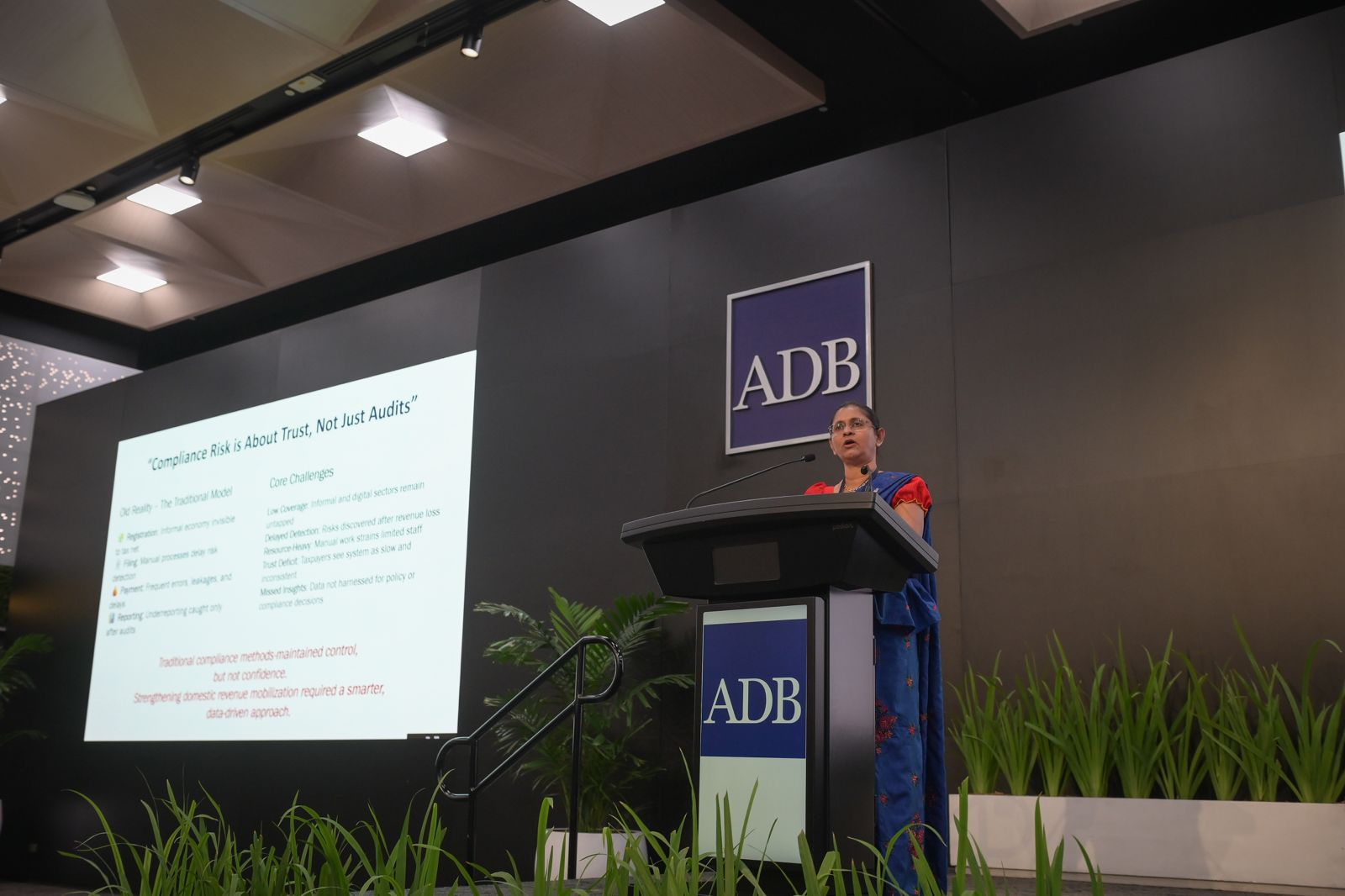


Sri Lanka to “Restructure two Housing Banks to Stop Looming Crisis”
The government has taken approved a bold restructuring initiative for two specialised banks Housing Development Finance Corporation Bank (HDFC Bank) and State Mortgage & Investment Bank (SMIB) as part of a broader effort to shore up the country’s financial stability and safeguard depositors’ interests.
Ownership Transfer
Under the approved plan, the Government will transfer its shareholding in HDFC Bank into Bank of Ceylon (BOC), making the housing finance specialist a subsidiary of the state-owned commercial bank. At the same time, all shares in SMIB will be acquired by People’s Bank, placing SMIB under its wing.
Background and Financial Challenges
Both HDFC Bank and SMIB serve a critical purpose: providing housing-related financial services in Sri Lanka. HDFC Bank was established under the Housing Development Finance Corporation Act No. 7 of 1997 and is listed on the Colombo Stock Exchange.
SMIB, formed under Act No. 13 of 1975, is fully state-owned and focused on mortgage financing. Yet both banks have been underperforming. HDFC Bank’s latest published financials show a net loss of around LKR 352 million, with return on equity (ROE) at –4.39% and return on assets (ROA) meaningfully negative at –0.54%.
The bank’s market capitalisation is just LKR 2.88 billion and its price-to-book ratio stands at a weak 0.37, underlining market concern about its profitability and asset quality.
For SMIB, the broader picture suggests weak deposit-raising capacity, low profitability and failing to meet capital adequacy norms—factors cited by the Central Bank of Sri Lanka as underpinning the push for restructuring.
Rationale for Restructuring
Why restructure? First, integrating these weaker specialised banks into stronger state banks allows for economies of scale, centralised risk management and access to deeper deposit bases. It emphasises that the housing finance niche cannot thrive in isolation when deposit mobilisation is limited and regulatory demands (such as capital adequacy) are not met.
Second, from a systemic risk perspective, weak specialised banks raise concerns over contagion within the financial system and erode depositor confidence especially in a pressured macro-economic environment.
Third, through the restructuring, the banks’ housing mandate can be preserved while being supported by stronger parent institutions capable of absorbing shocks and providing strategic direction.
Strategic Challenges
However, the restructuring must go further than ownership changes. It must address core strategic failings: lack of diversification, weak profitability, low capital buffers, and sub-par asset quality. At HDFC Bank, the negative ROE and ROA reveal that returns are not covering cost of equity and assets are not generating sufficient incomeraising questions about business model viability.
At SMIB, its niche focus on housing finance may not be sufficient in a challenging interest rate and economic climate, unless operational efficiencies and business scope are widened.
Policymakers should set clear milestones: accelerated deposit growth, improvement in net interest margin, reduction in non-performing loans (NPLs), and enhancement of capital adequacy ratios and integration of digital banking capabilities. These should be tracked publicly to ensure the restructuring yields measurable improvements and does not simply become a cosmetic ownership shift.
In sum, the Cabinet-approved transfer of shares in HDFC Bank and SMIB into larger state-owned banks is a welcome recognition that these specialist institutions have not progressed satisfactorily on their own. With HDFC Bank posting losses and SMIB under regulatory strain, the need for decisive action is clear.
But success will depend on more than structural change it will require rigorous business model overhaul, stronger governance and ongoing regulatory oversight if depositors and the housing finance sector are to reap the benefits of stability and growth

Expert Warns Rapid Tariff Cuts Risk Economic Self-Sabotage
Sri Lanka must not rush into dismantling tariffs and para-tariffs under the newly introduced Economic Stabilisation Act, No. 45 of 2024, until the country rebuilds “safe and sustainable” levels of foreign exchange reserves, a leading industry expert has cautioned.
Ceylon United Business Alliance (CUBA) Industry Sub-Committee Chairman and former KPMG auditor M.R. Jeffrey warned that while the Act’s goal of modernising the tariff system is commendable, any unilateral opening of the economy would be dangerously premature in the current fragile environment.
Tariff Cuts Premature Amid Fragile Forex Position
Jeffrey argued that tariff reforms should not move ahead unless regional economies adopt similar frameworks, noting that Sri Lanka cannot afford to liberalise when neighbouring countries continue to shield their industries with robust protectionist policies.
“We are still under severe forex pressure,” he said. “If we remove protective duties now, cheap imports will flood the market, the rupee will come under renewed attack, and our domestic industries which we are struggling to revive will face further collapse.”
He stressed that under WTO Article XXVIII and the Common But Differentiated Responsibilities (CBDR) principle, Sri Lanka has every right to adopt a gradual and strategic path toward liberalisation rather than emulate the accelerated timelines expected of wealthier nations.
Para-Tariff Distortions: Politically Favoured Sectors vs. Neglected Industries
Jeffrey highlighted deep historical distortions in the country’s para-tariff structures, pointing out that earlier administrations provided extraordinary protection to sectors such as tiles, aluminium, and hardware often linked to politically connected interests with para-tariffs ranging from 40% to 75%.
In sharp contrast, one of Sri Lanka’s largest domestic consumption industries the $2 billion clothing sector received only 5% to 10% protection. He cited the example of imported denim fabric, which faces a mere Rs. 200 para-tariff per metre, despite Sri Lanka having the capability to produce it competitively.
“This imbalance distorts market competition, discourages local manufacturing, and rewards import-heavy business models,” he said. “Such a system is economically indefensible.”
Jeffrey added that Sri Lanka must abandon politically motivated tariff protection and move toward a uniform, transparent, and rational tariff band, similar to the 25–35% protection range used by most developing economies.
Call for WTO-Compliant Safeguards
Rather than blindly cutting tariffs, Jeffrey urged policymakers to adopt WTO-permitted non-tariff measures including stricter quality standards, licensing frameworks, and safeguard clauses that protect domestic industries without breaching international trade commitments.
He insisted that any future tariff liberalisation must be linked to a foreign reserve threshold, ensuring that reforms do not undermine economic stability.“Economic sovereignty begins with economic stability,” he emphasised.
The CUBA Industry Sub-Committee continues to advocate for evidence-based reforms across apparel, footwear, industrial materials, and related sectors

Sri Lanka Moves to Enact Investment Security Law for Stability
Strengthening Investor Protection and Policy Stability
In a decisive move to restore investor confidence and ensure long-term policy stability, the Government of Sri Lanka has approved the drafting of a new Investment Security Act, designed to prevent arbitrary nationalization of private enterprises and safeguard both domestic and foreign investments.
The proposal, presented to the cabinet by President Anura Kumara Dissanayake in his capacity as Minister of Finance, Plan Implementation, and Economic Development, aims to establish a stronger legal foundation for investment protection and dispute resolution.
The Cabinet of Ministers has already granted approval for the Legal Draftsman’s Department to begin preparing the bill, following recommendations from a high-level committee of officials who developed the initial concept paper.
The Act is expected to include provisions that guarantee the protection of private property, create an Investment Security Board to handle disputes, and enhance transparency in government dealings with investors.
This landmark legislation was first proposed in the 2025 National Budget, reflecting the administration’s effort to rebuild investor trust shattered during the economic crisis of 2022.
During that period, Sri Lanka’s economy contracted by 7.8%, inflation surged above 70%, and foreign direct investment (FDI) inflows fell to below US $800 million one of the lowest levels in over a decade.
The uncertainty surrounding property rights, ad-hoc taxation, and frequent policy shifts further discouraged new investors and prompted several multinationals to postpone or withdraw expansion plans.
Rebuilding Confidence Amid Economic Recovery
However, in the first nine months of 2025, signs of gradual recovery have emerged. According to the Central Bank, Sri Lanka recorded FDI inflows of approximately $950 million, marking a 15% year-on-year increase compared to 2024.
The rupee has stabilized around Rs. 310 per dollar, inflation has eased to 5.2%, and GDP growth is projected at 2.8% for the year. Yet, economists warn that without consistent policy frameworks and legal assurance, this recovery remains fragile.
The proposed Investment Security Act is thus seen as a critical step toward creating a predictable investment climate. It will legally prohibit the arbitrary seizure or nationalization of private enterprises fear that resurfaced during past political transitions and ensure that any state intervention occurs under transparent, compensatory frameworks.
Economic analysts argue that the Act could also help Sri Lanka improve its ranking in the World Bank’s Ease of Doing Business Index, attract long-term investors, and position itself as a stable investment hub in South Asia.
The new Investment Security Board will serve as a dispute resolution mechanism, enabling investors to settle grievances without lengthy litigation, thereby speeding up decision-making and reducing bureaucratic risks.
If implemented effectively, the Act could complement the broader economic stabilization program under the IMF’s Extended Fund Facility and reinforce the government’s pledge to maintain a liberal, rules-based economy.
As Sri Lanka transitions from crisis management to growth revival, ensuring investor protection through robust legislation will be vital to attracting capital, creating jobs, and sustaining confidence in its economic future

Tourism Earnings Hit USD 2.65 Billion in First 10 Months of 2025
The Central Bank of Sri Lanka reports that total tourism earnings for the first ten months of 2025 stand at USD 2,659 million.
Tourism revenue recorded for October 2025 alone amounts to USD 186.1 million.
According to the Central Bank, this reflects a 4.9% increase compared to the first ten months of 2024, during which earnings reached USD 2,533.7 million.
Meanwhile, the latest statistics from the Sri Lanka Tourism Development Authority show that 1,972,957 tourists arrived in the country between January and November 12, 2025.
Of these arrivals, 443,622 were from India, 180,592 from the United Kingdom, 144,308 from Russia, 123,053 from Germany, and 115,400 from China.
Between November 1 and 12, Sri Lanka welcomed 82,270 foreign visitors.
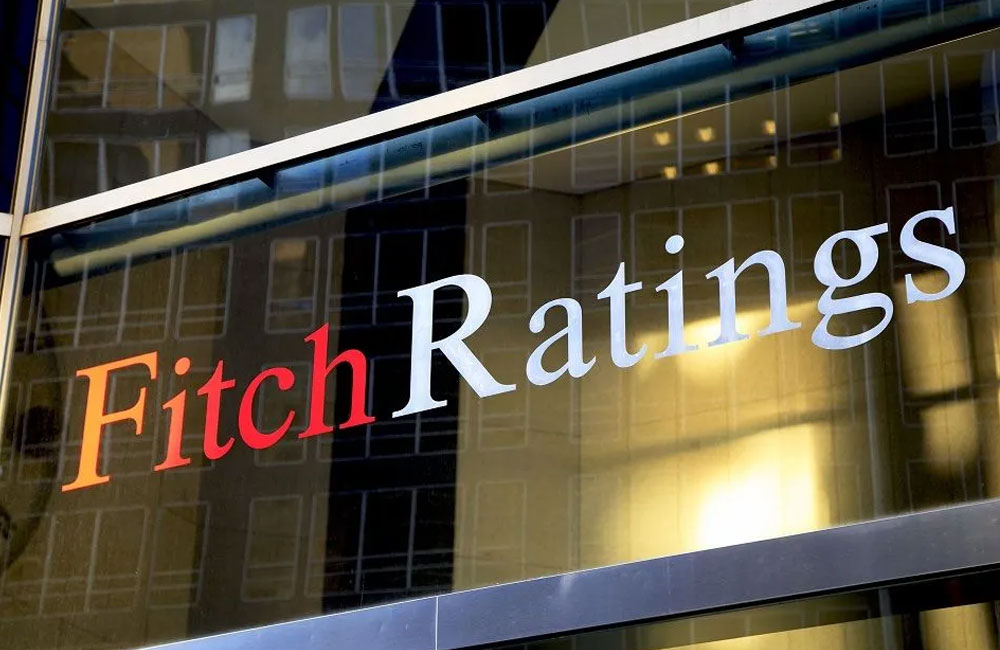
Reduction in Govt spending could weaken Sri Lanka’s growth potential - Fitch Ratings
Shortfalls in implementing planned investment spending could weaken Sri Lankan economy’s growth potential, making longer-term fiscal consolidation more challenging, Fitch Ratings said.
Meanwhile, Fitch noted that the government’s 2026 budget proposals indicate that the authorities remain committed to reducing government debt/GDP over the medium term after beating the targets in the 2025 budget.
Fitch Ratings is also of the view that sustained strong revenue performance will remain key to meeting the government’s fiscal goals.
The budget, unveiled on 7 November, targets a deficit of 5.1% of GDP in 2026, wider than the 4.5% that the government expects in 2025. The original deficit target for 2025 in last year’s budget was 6.7% of GDP, but in March the International Monetary Fund (IMF) projected a lower figure of 5.4%.
The latest budget forecasts the primary balance before interest payments will remain in surplus at 2.5% of GDP in 2026, down from an expected 3.8% in 2025, but still above the 2.3% target under Sri Lanka’s IMF programme. The government aims to reduce the fiscal deficit to 3.8% of GDP by 2030 under its medium-term fiscal framework.
Fitch Ratings noted that continuing to meet the key fiscal markers laid out in the IMF programme would help the authorities to improve Sri Lanka’s policy-making record adding macroeconomic stability would also benefit.
The official budget deficit projection for 2026 is wider than the 4.6% of GDP that Fitch anticipated when it affirmed Sri Lanka’s rating at ‘CCC+’ in October 2025. However, the effect on Sri Lanka’s debt trajectory could be more than offset by the over-performance in 2025, where Fitch Ratings had expected a budget deficit of 5.4% and a primary surplus of 2.4%.
Fitch Ratings stressed that the outperformance in 2025 was partly driven by underspending, with the public investment/GDP ratio significantly below target, at 3.2% against the original goal of 4%.
It added “shortfalls in implementing planned investment spending could weaken the economy’s growth potential, making longer-term fiscal consolidation more challenging.”
However, Fitch stated that the latest budget highlights several measures that have the potential to lift investment and benefit growth including the resumption of an expansion of Bandaranaike International Airport (BIA), a Rs. 342 billion (1% of 2026 Fitch-estimated GDP) allocation towards road development, tax incentives for the construction of digital infrastructure and planned legislation to increase the use of public-private partnerships in infrastructure projects.
(Source : adaderana.lk)

Port City Office Boom Signals Stronger Economic Revival
Sri Lanka’s Port City Colombo is experiencing a surge in foreign investment, with several major real estate and infrastructure projects recently designated as “Primary Businesses of Strategic Importance” a clear sign of growing global confidence in the special economic zone (SEZ).
It has has gained a fresh boost as a Singapore-led consortium announced a major investment in a new 34-storey commercial tower, marking one of the most significant international commitments to the project this year..
A consortium headed by Canary Wharf Holdings Pte Ltd has signed an agreement with CHEC Port City Colombo (Pvt) Ltd to develop the Colombo Gateway Tower One
Among the key developments announced this year are four landmark projects that together represent over US$ 1 billion in foreign direct investment (FDI). Daily Mirror+2Ceylon Today+2
IFC Colombo 1 (Pvt) Ltd A subsidiary of CHEC Port City Colombo (owned by China Harbour Engineering Company), this mixed-use development on a 12,561 m² plot is backed by an investment of US$ 142.7 million.
Ceylon Real Estate Holdings (Pvt) Ltd Focused on residential and commercial construction, this group is putting in US$ 320 million for their projects inside the Port City. Ceylon Today
Clothespin Management & Development (Pvt) Ltd Behind the ambitious “Clothespin Towers” twin-tower plan, combining ultra-luxury residences, a seven-star hotel, high-end retail, and art facilities. Their commitment amounts to about US$ 540.1 million, including land and construction.
ICC Port City (Pvt) Ltd A high-end residential proposal featuring two luxury apartment towers and villas, investing US$ 66 million, alongside LKR 13.8 billion in development.
Building Momentum: Developments Already Underway
Beyond the newly designated flagship ventures, several other projects in Port City Colombo are progressing rapidly, underscoring the SEZ’s momentum.
Luxury Marina Development: A high-profile waterfront scheme that broke ground in January 2025. Jointly developed by Browns Investments PLC (LOLC Group) and CHEC, this project spans 33,776 m² and has attracted US$ 120 million in investment.
It will host restaurants, retail, entertainment spaces, and a marina capable of berthing up to 200–250 yachts, betting on Sri Lanka’s potential as a regional yachting hub.
Business Centre / IT Hub: Operational commercial activity began in June 2025, following the handover of nine low-rise buildings including an IT hub and office cluster.
This centre, backed by a US$ 5 million FDI injection from CHEC, has already leased about 80% of its capacity to “Authorised Persons” approved by the Port City Economic Commission.
According to the Port City Economic Commission, further long-term investment pipelines include plans for an international university, hospital, and school within the SEZ.
Economic Impact & Strategic Significance
These developments come at a critical juncture for Sri Lanka. The estimated full potential of Port City Colombo is immense: when completed, the 269-hectare reclaimed area is projected to house up to US$ 15–20 billion in total FDI over time.
Already, the US$ 1.4 billion initial investment by China Harbour Engineering Company (CHEC) makes this SEZ one of Sri Lanka’s largest foreign-led development partnerships.
Port City has also earned recognition: in October 2025, it was named the Asia-Pacific’s Best Knowledge Zone by fDi Intelligence, highlighting its emerging role in innovation, technology, and free-zone services.

MSMEs in Sri Lanka Teeter as Credit and Relief Support Falter
The micro, small and medium enterprise (MSME) sector in Sri Lanka—long hailed as the backbone of the economy is now facing acute stress, with many firms on the verge of collapse amid constrained bank lending and inadequate government relief. While MSMEs contribute over half the nation’s gross domestic product and employ millions, their plight is now emerging as a critical fault‐line.
Budget 2026 offers no meaningful lifeline
Speaking on behalf of the Ceylon Federation of MSMEs, President Mahendra Perera warned that the 2026 Budget fails to provide meaningful support to this vital constituency. He highlighted two major concerns: the absence of viable relief for businesses saddled with non-performing loans, and the impending reduction of the VAT registration threshold from Rs. 60 million to Rs. 36 million, effective April 2026 a move he says will squeeze small retailers and shift the burden onto struggling consumers.
NPL firms are shut out of new credit lines
Despite the government introducing new credit lines for MSMEs, Perera pointed out that businesses which have already suffered multi-year losses cannot access fresh financing because they are classified as NPLs (non-performing loans). “There is no mechanism for businesses that have been hit over the past five years to obtain new loans,” he told the Daily FT. Many firms remain liquidity-constrained, unable to service existing debt, let alone grow.
Official data underline how critical MSMEs are to Sri Lanka’s economy. The sector is estimated to generate over 52% of GDP and employ around 4.5 million people.
Yet, the support structure is breaking down. A survey commissioned by the government found that during 2019–22 more than one-in-five surveyed MSMEs had closed permanently or temporarily 20.2%.
While some relief measures were introduced such as circulars from the Central Bank of Sri Lanka (CBSL) advising banks to negotiate business revival plans with affected SMEs by 31 March 2025 critics say they fall far short of the scale and specificity required.
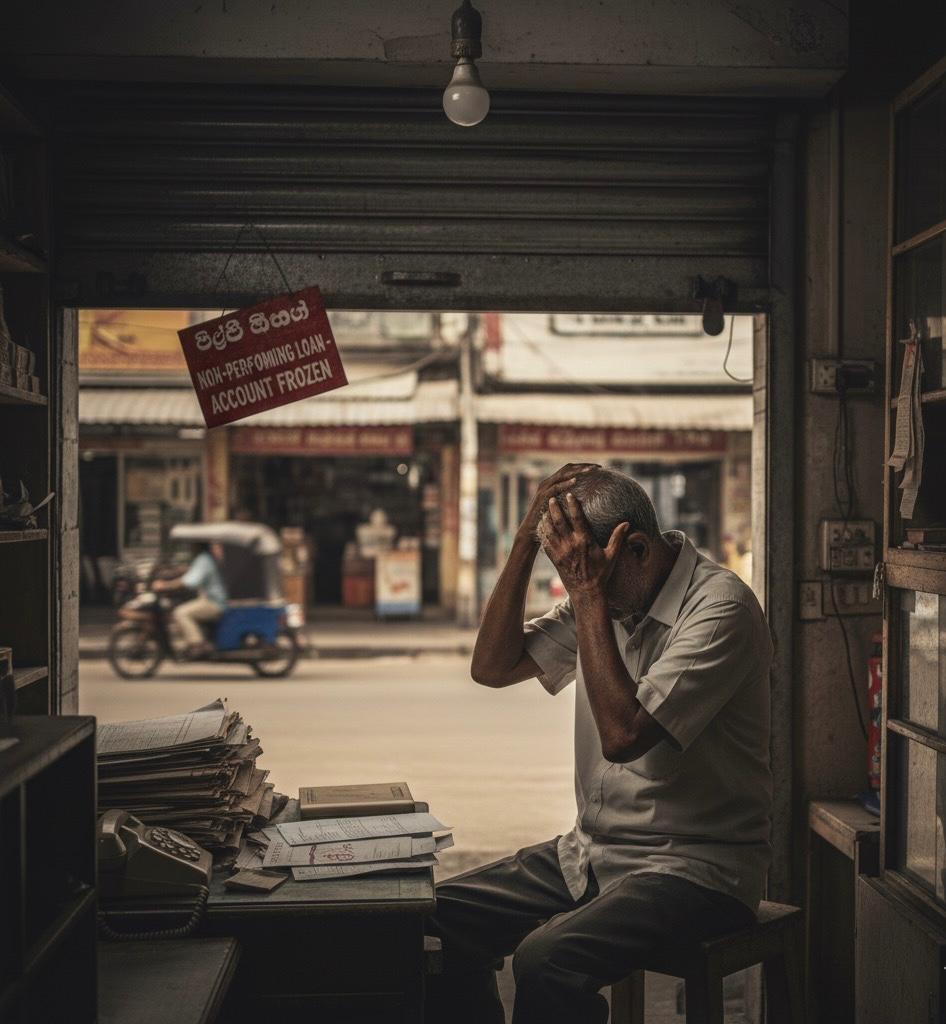
Banks still go for collateral, not restructuring
The bank-execution issue looms large. Many MSMEs report that banks continue to move toward enforcing collateral calls and recovery actions rather than restructuring loans. Such pressure comes just when government-promoted budgeted credit facilities are being rolled out, yet these schemes do not reach enterprises already trapped in NPL status. The mismatch, Perera says, means that while new financing is nominally available, the firms that most need help are excluded.
Adding to the complexity is the value-added tax change. By lowering the registration threshold to Rs. 36 million, the government risks dragging more small retailers into the VAT net and increasing end-consumer VAT burdens potentially reducing demand for MSME-supplied goods and services just as cash‐flow is already under strain.
Macro risk to Sri Lanka’s growth path
The MSME crisis also has broader macro implications. With MSMEs accounting for such a large part of output and employment, their distress risks dragging down investment, exports and broader growth momentum. The economy grew by around 4.5% in the first quarter of 2025, but analysts warn that structural damage and enterprise distress could undermine this recovery.
In the coming days, the Federation plans to press the government and engage with banks to advance a practical mechanism that will restore viable access to capital for genuinely affected MSMEs. Without such intervention, the sector may not only shrink but also leave a lasting void in Sri Lanka’s employment and growth engine.
The signs are clear: Sri Lanka’s MSMEs are running on fumes. They require targeted relief, inclusive credit restructuring and demand‐support policies not just new loan schemes that do not reach the hardest hit. Whether policy-makers step in now will determine whether the sector survives or becomes another casualty of the crisis.
Page 1 of 22